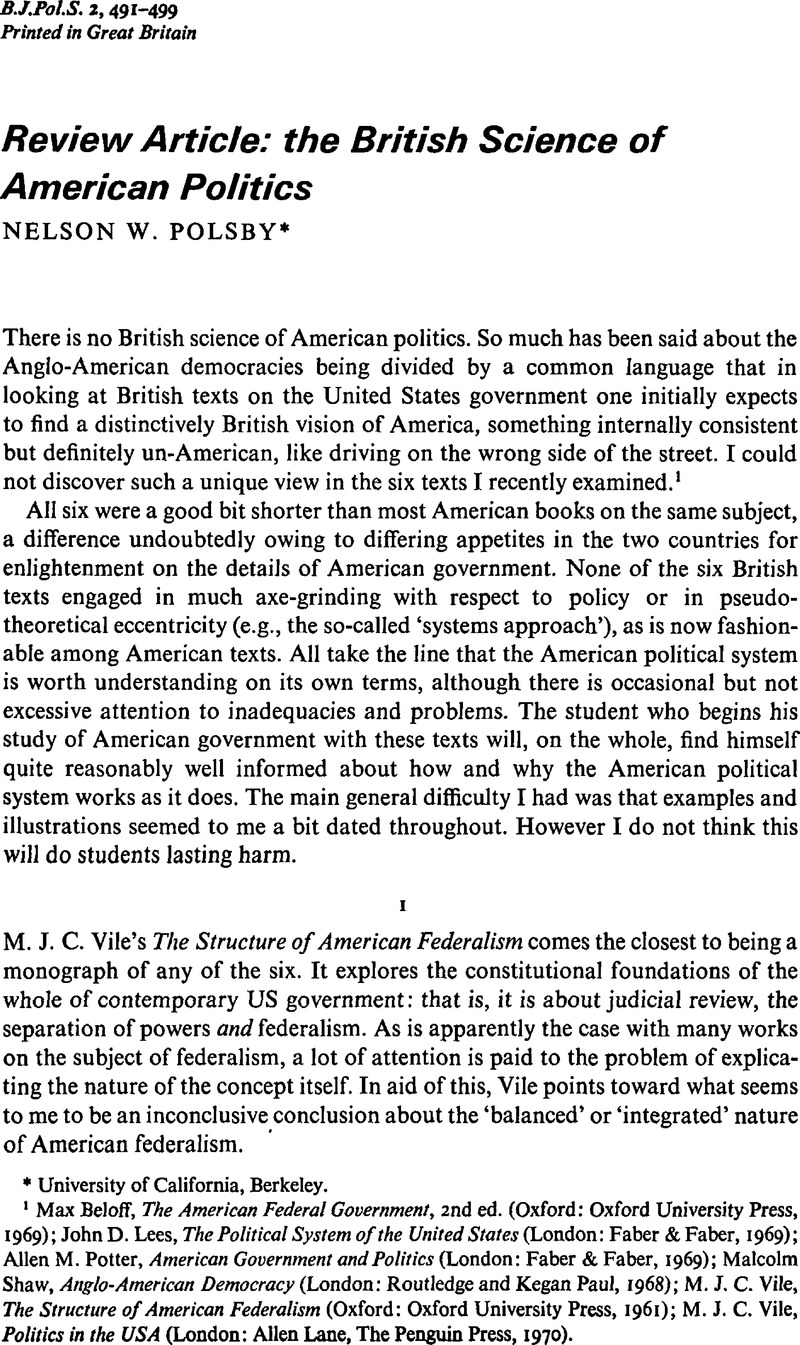Article contents
Review Article: the British Science of American Politics
Published online by Cambridge University Press: 27 January 2009
Abstract

- Type
- Review Article
- Information
- Copyright
- Copyright © Cambridge University Press 1972
References
1 Beloff, Max, The American Federal Government, 2nd ed. (Oxford: Oxford University Press, 1969)Google Scholar; Lees, John D., The Political System of the United States (London: Faber & Faber, 1969)Google Scholar; Potter, Allen M., American Government and Politics (London: Faber & Faber, 1969)Google Scholar; Shaw, Malcolm, Anglo-American Democracy (London: Routledge and Kegan Paul, 1968)Google Scholar; Vile, M. J. C., The Structure of American Federalism (Oxford: Oxford University Press, 1961)Google Scholar; Vile, M. J. C., Politics in the USA (London: Allen Lane, The Penguin Press, 1970).Google Scholar
2 It would take too long here to spell out the alternative arguments in detail, but the interested reader can find an early attempt to do this in Polsby, Nelson W., ‘Towards an Explanation of McCarthyism’, Political Studies, VIII (1960), 250–71.CrossRefGoogle Scholar
3 See Polsby, Nelson W. and Wildavsky, Aaron, Presidential Elections, 3rd ed. (New York: Scribner, 1971), pp. 253–8Google Scholar, for a further discussion of this problem.
4 See Almond, Gabriel A. and Verba, Sidney, The Civic Culture (Princeton: Princeton University Press, 1963), p. 171.CrossRefGoogle Scholar
5 See di Palma's, Giuseppe discussion of this point in Apathy and Participation (New York: The Free Press, 1970), pp. 143ff.Google Scholar
6 Polsby, Nelson W., Congress and the Presidency (Englewood Cliffs, N.J.: Prentice-Hall, 1964). p. 62.Google Scholar Although this book is cited in Lees’ earlier The Committee System of the United States Congress (London: Routledge and Kegan Paul, 1967), pp. 37, 112Google Scholar, there is no mention of it inThe Political System of the United States
7 See Brogan, D. W., Politics in America (Garden City, N.Y.: Doubleday Anchor, 1960), pp. 266–7.Google Scholar
8 The relevant passage in Brogan, is, Politics in America, p. 274.Google Scholar
9 Actually, Shaw and Potter are identified as Americans; both have lived and worked in England for some years however.
10 Neustadt, Richard E., Alliance Politics (New York: Columbia University Press, 1970).Google Scholar
11 I do not know how much to credit reports of the severe subcultural insularity displayed by former members of the Kennedy administration now teaching at Harvard who, returning to Washington at the time of the US Cambodian incursion to lobby a relatively unsympathetic executive branch, ‘discovered’ Congress. See Michael E. Kinsley, ‘The Harvard Brain Trust: Eating Lunch at Henry’s’, and Averill, John, ‘Eating Crow at Mike’s’, The Washington Monthly, 2 (09 1970), pp. 45–50.Google Scholar Averill concludes: ‘We may anticipate theoretical discoveries at Harvard and elsewhere, impelling the scholarly investigator toward the conclusion that Congress must have a greater portion of the power in the United States.’
12 Neustadt discloses (Alliance Politics, pp. 7, 150) that he unearthed just these sorts of matcrial on both sides of the Atlantic at President Kennedy’s request after the Skybolt cpisode, and that he has written his findings down. In Alliance Politics, however, such a small portion of this iceberg shows that we have no way of knowing whether Neustadt’s conclusion from his evidence are sound.
13 Both these sentiments are mentioned and deplored (especially in the Preface to the American edition) in Crick, Bernard, The Reform of Parliament (Garden City, N.Y.: Doubleday Anchor, 1965).Google Scholar
14 This latter is in fact Neustadt's argument. See (e.g.) Alliance Politics, pp. 69, 115ff.
15 Ranney, Austin, Pathways to Parliament (Madison: University of Wisconsin Press, 1965)Google Scholar; Eckstein, Harry, Pressure Group Politics: The Case of the British Medical Association (Stanford: Stanford University Press, 1960)Google Scholar; Beer, Samuel H., Treasury Control: The Coordination of Financial and Economic Policy in Great Britain (Oxford: Clarendon Press, 1956)Google Scholar; Epstein, Leon D., ‘The Cohesion of British Parliamentary Parties’, American Political Science Review, L (1956), 360–77CrossRefGoogle Scholar; ‘New MPs and the Politics of the PLP’, Political Studies, X (1962), 121–9Google Scholar; British Politics in the Suez Crisis (Urbana: University of Illinois Press, 1964)Google Scholar. Compare Laski's, Harold J. poignant comment in the Preface to his 1940 lectures on the Presidency: ‘American scholars have done so much, especially in recent years, for the study of English institutions, that I hope this little book may stimulate British students to realize something of the interest and fascination of American history and politics.’ The American Presidency (New York: Harper, 1940), p. viii.Google Scholar
16 I share the view of Douglas Price that the contribution of the term ‘psephology’, used only in England to describe voting behaviour studies, is not particularly impressive. See Price, , ‘"Critical Elections” and Party History: A Critical View’, Polity, IV (1971), p. 237.Google Scholar
17 After some thought, and much consultation with the bibliographies of the texts under review, I propose the following possible exceptions: Vile's book on American federalism, the Brogan, and Laski, books mentioned above, and Beloff, Max, Foreign Policy and the Democratic Process (Oxford: Oxford University Press, 1954).Google Scholar All of these have the character of interpretive essays, mostly synthesizing knowledge already known to specialists.
18 Ions, Edmund, James Bryce and American Democracy 1870–1922 (London: Macmillan, 1968).CrossRefGoogle Scholar
19 On recent contributions to the study of American politics by British journalists, for example, I should render a mixed verdict. Fairlie's, Henry splendidly idiosyncratic ‘Thoughts on the Presidency’, The Public Interest, IX (1967), 28–48Google Scholar, and Norman Macrae's 10 May 1969 supplement to The Economist, ‘The Neurotic Trillionaire’, I thought first-rate. Divided They Stand (London: Michael Joseph, 1969) by English, DavidGoogle Scholar and the staff of the Daily Express is a workmanlike attempt to fathom the American election of 1968 that offers no particular illumination. I have dealt unkindly in another place with the glib and shabby An American Melodrama (London: Andre Deutsch, 1969) by Chester, Lewis, Hodgson, Godfrey and Page, Bruce.Google Scholar See ‘Our Quadrennial Drama’, The American Scholar, XXXIX (1969–70), 160–5.Google Scholar
- 5
- Cited by




